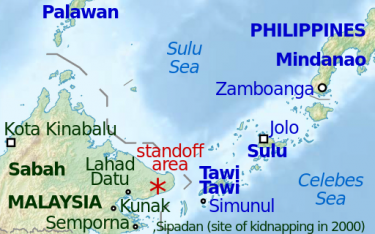
On February 9, 2013, 200 armed Filipinos belonging to the so-called Royal Sulu Army occupied parts of Lahad Datu in Sabah (North Borneo) and declared ownership of the whole territory in the name of the Sulu Sultan Jamalul Kiram III.
Sabah has been part of the Malaysian Federation since 1963. In response, the Sulu Sultanate has continued to assert its historical and proprietary claims over the territory. Moreover, the Philippines has yet to officially drop its claim that Sabah is part of its territory.
For three weeks, the Malaysian government asked the armed Filipinos in Lahad Datu to surrender. But finally on March 5, the military attacked the group and ended the occupation. The clash and subsequent military operations reportedly led to the killing of more than 60 individuals, including 8 members of the Malaysian police.
The Malaysian Ministry of Foreign Affairs was quick to brand the armed Filipinos as terrorists. The Philippine government – which is currently finalizing a peace agreement with Muslim separatists in the southern part of the country – also condemned the occupation. President Benigno S. Aquino III accused “persons of interest” associated with his predecessor’s administration of “conspiring” to spark trouble in Sabah:
We are aware that there are those who conspired to bring us to this situation — a situation that has no immediate solutions. Some of their identities are clear to us, while others continue to skulk in the shadows.
To the people who are behind this, even now, I tell you: you will not succeed. All those who have wronged our country will be held accountable.
Interestingly, the Malaysian Prime Minister Najib Razak has yet to dismiss the theory that Malaysian opposition politicians have conspired with the Sulu Sultan in order to destabilize the country and bring down the ruling coalition ahead of this year’s general elections.
Humanitarian Crisis
The Lahad Datu standoff also sparked a humanitarian crisis after scores of Sabah residents with Filipino ancestry were arrested and 1,500 migrant Filipinos sought refuge in the Philippines. There are also allegations of human rights abuses committed by the Malaysian security forces, a claim that was strongly denied by the Kuala Lumpur government. The Sabah Coalition of Human Rights Organisations raised additional concerns about the impact of the military operation on Sabah’s residents:
Militarisation and the presence of security forces have created many roadblocks restricting the movements of the indigenous peoples in their foraging for food, harvesting, hunting and fishing.
The limitations on travel will result on food shortages for them.
Indeed, the Sabah question is likely to pose problems for both Malaysia and the Philippines for the foreseeable future. For instance, Carol Araullo of the left-leaning Bayan coalition accuses Aquino of abandoning the Philippines’ claims over the territory:
Many are beginning to surmise that the Aquino regime is not all convinced that the Sabah claim has merit and his description of it as a “hopeless cause” is not just a slip of the tongue indicating “ignorance or incompetence” as Sultan Jamalul Kiram III suspects, but his regime’s point of view and even policy on the matter.
R Kengadharan raises these questions for the Malaysian government:
How did the armed intruders enter our shores without the knowledge of our navy?
What has happened to our domestic and regional intelligence services?
Who has been providing the self-proclaimed sultan of Sulu arms?
Who is providing guerrilla training for the armed intruders in Sulu?
To avert a similar crisis in the future, perhaps the time has come for the leaders of Malaysia and the Philippines to settle once and for all the Sabah issue.
For related content please see:
Malaysia’s Coming Election: Beyond Communalism?
For more information on issues and events that shape our world please visit the ISN’s featured editorial content and Security Watch.

